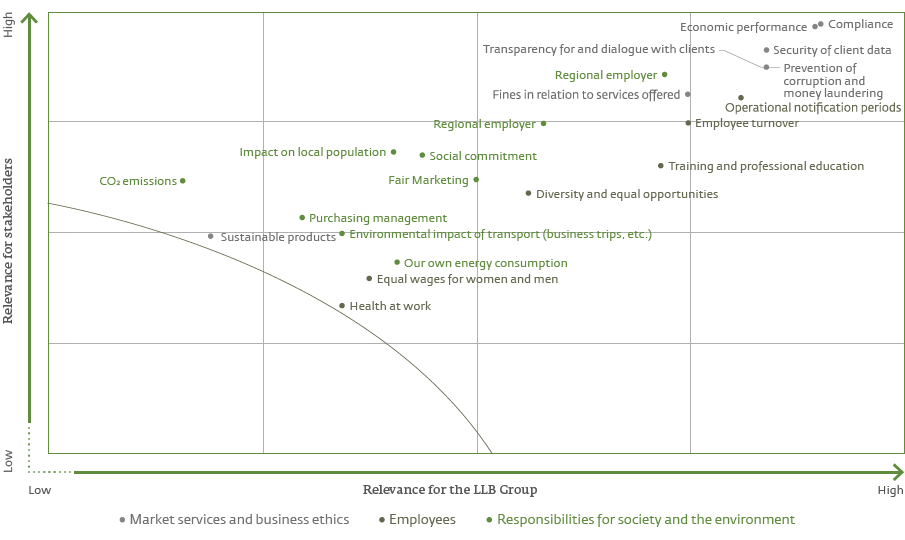Sustainability mandate
The LLB Group aims to act responsibly. As partner of the Principality of Liechtenstein as well as of society and the economy, we are committed to leaving future generations with stable social conditions and an environment that is as intact as possible.
The LLB Group’s business policy, which is focused on continuity, forms the basis for sustainable action. Sustainability to us means balancing economic action with social and environmental responsibility. The Annual Report 2016 contains an integrated “Stakeholders report”, which was prepared in accordance with the Global Reporting Initiative (GRI) G4 Sustainability Reporting Guidelines – “Core Option” for the second time, the first time being in 2015. By doing this, we are highlighting our proactive focus on sustainability.
At the end of 2014, we compiled a set of about 21 sustainability topics. In 2015, in accordance with version 4.0 of the GRI, we established, reviewed and evaluated a list of material aspects and indicators and focused on strategic priorities. We reviewed and slightly supplemented the material aspects in 2016.
Client-oriented
The values of “integrity”, “respectfulness”, “excellence” and “pioneering” (see chapter “Strategy and organisation”) underpin the LLB Group’s actions. We are client-oriented and, as such, are investing in the further development of the physical and electronic contact points (see chapters “Retail & Corporate Banking”; “Corporate Center”). Here we are paying particular attention to meeting our clients’ security needs and our data protection standards for the use of the various distribution channels at all times.
Contribution to the sustainable development of Liechtenstein
The LLB Group, as a part of the community, is active in different areas of culture, ecology and society (see chapter “Brand and sponsoring”). Our contribution to the sustainable development of a prosperous Liechtenstein forms the basis for the fulfilment of our performance mandate. We indirectly promote Liechtenstein as a workplace and contribute to the prosperity of the people (see chapter “Retail & Corporate Banking”).
In dialogue with stakeholder groups
For the LLB Group, sustainability as a corporate responsibility means meeting the expectations of the different internal and external stakeholder groups. In 2016, the Group Corporate Communications & General Secretary Business Area worked together with the line and support units of the core team to further develop the key sustainability topics. While the members of this core team represent the views of the LLB Group, they are in regular dialogue – personally, by electronic media or telephone, or at information meetings, working sessions, roadshows or conferences – with the different stakeholders who we influence and who, in turn, influence the course of our business. The stakeholder groups are in particular:
- Clients: Their needs are uppermost at every point of contact. Our client advisers systematically record client needs plus private and corporate client satisfaction. The LLB Group fosters partnership-based dialogue with its institutional clients via its “LLB Xpert Views” online platform and in round-table discussions (see chapters “Retail & Corporate Banking”, “Private Banking” and “Institutional Clients”).
- The Principality of Liechtenstein: The Principality of Liechtenstein is our majority shareholder. The Chairman of the Board of Directors of the LLB Group and the Group CEO submit a bi-annual report on the course of business to the Head of the Government of Liechtenstein. Once a year, the Board of Directors and the Group Executive Board exchange views with the entire Government. It, in turn, reports to the Finance Commission of the Landtag (Parliament) on the implementation of the investment strategy of Liechtensteinische Landesbank AG (see chapter “Corporate governance”).
- Shareholders: In addition to the annual General Meeting of Shareholders, we exchange views with our shareholders at investor presentations and in regular meetings with the Liechtenstein Government as the representative of the majority shareholder, the Principality of Liechtenstein (see chapter “Corporate governance”).
- The public: We are in continuous dialogue with the public through our employees. We also foster an intensive exchange with media representatives (see chapter “The LLB share”).
- Partners and non-governmental organisations (NGOs): Through our membership of associations and organisations, we maintain a dialogue with partners and NGOs (see chapters “Regulatory framework and developments”, “Institutional Clients”, and “Responsibilities for society and the environment”).
- Employees: We obtain our employees’ opinions by engaging in dialogue during the annual objective-setting process as well as in the employee survey, which is conducted every two years (see chapter “Employees”).
Key sustainability topics
Sustainable business management and long-term responsibility are core values to us. The key factors in selecting and prioritising topics for the materiality matrix were: the external impact; the impact on the stakeholder groups; the relevance to the existence of the banking group; and public perception. For the key sustainability topics, we defined the relevant GRI aspects and indicators. The LLB Group closely monitors the topics included in the materiality matrix (see chart above) and addresses them individually. The topics positioned in the top right of the matrix are of particular significance. In 2016, we further developed the process of identifying and managing sustainability topics.
Materiality matrix for sustainability aspects

This page includes, inter alia, disclosures on Global Reporting Initiative (GRI) indicator G4-18, G4-19, G4-23, G4-24, G4-25, G4-26 and G4-27.
A complete list of all GRI indicators shown in the report can be found in the GRI Content Index.